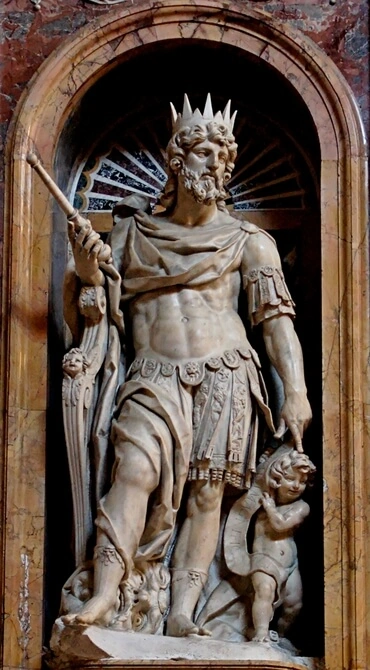1
Or avvenne, dopo queste cose, che il re dei figliuoli di Ammon morì, e Hanun, suo figliuolo, regnò in luogo di lui.
2
Davide disse: "Io voglio usare verso Hanun, figliuolo di Nahash, la benevolenza che suo padre usò verso di me". E Davide mandò i suoi servi a consolarlo della perdita del padre. Ma quando i servi di Davide furon giunti nel paese dei figliuoli di Ammon,
3
i principi de’ figliuoli di Ammon dissero ad Hanun, loro signore: "Credi tu che Davide t’abbia mandato dei consolatori per onorar tuo padre? Non ha egli piuttosto mandato da te i suoi servi per esplorare la città, per spiarla e distruggerla?"
4
Allora Hanun prese i servi di Davide, fece lor radere la metà della barba e tagliare la metà delle vesti fino alle natiche, poi li rimandò.
5
Quando fu informato della cosa, Davide mandò gente ad incontrarli, perché quegli uomini erano oltremodo confusi. E il re fece dir loro: "Restate a Gerico finché vi sia ricresciuta la barba, poi tornerete".
6
I figliuoli di Ammon, vedendo che s’erano attirato l’odio di Davide, mandarono a prendere al loro soldo ventimila fanti dei Siri di Beth-Rehob e dei Siri di Tsoba, mille uomini del re di Maaca, e dodicimila uomini della gente di Tob.
7
Quando Davide udì questo, inviò contro di loro Joab con tutto l’esercito degli uomini di valore.
8
I figliuoli di Ammon uscirono e si disposero in ordine di battaglia all’ingresso della porta della città, mentre i Siri di Tsoba e di Rehob e la gente di Tob e di Maaca stavano a parte nella campagna.
9
Or come Joab vide che quelli eran pronti ad attaccarlo di fronte e alle spalle, scelse un corpo fra gli uomini migliori d’Israele, lo dispose in ordine di battaglia contro i Siri,
10
e mise il resto del popolo sotto gli ordini del suo fratello Abishai, per tener fronte ai figliuoli di Ammon;
11
e disse ad Abishai: "Se i Siri son più forti di me, tu mi darai soccorso; e se i figliuoli di Ammon son più forti di te, andrò io a soccorrerti.
12
Abbi coraggio, e dimostriamoci forti per il nostro popolo e per le città del nostro Dio; e faccia l’Eterno quello che a lui piacerà".
13
Poi Joab con la gente che avea seco, s’avanzò per attaccare i Siri, i quali fuggirono d’innanzi a lui.
14
E come i figliuoli di Ammon videro che i Siri eran fuggiti, fuggirono anch’essi d’innanzi ad Abishai, e rientrarono nella città. Allora Joab se ne tornò dalla spedizione contro i figliuoli di Ammon, e venne a Gerusalemme.
15
I Siri, vedendosi sconfitti da Israele, si riunirono in massa.
16
Hadadezer mandò a far venire i Siri che abitavano di là dal fiume, e quelli giunsero a Helam, con alla testa Shobac, capo dell’esercito di Hadadezer.
17
E la cosa fu riferita a Davide che radunò tutto Israele, passò il Giordano, e giunse ad Helam. E i Siri si ordinarono in battaglia contro Davide, e impegnarono l’azione.
18
Ma i Siri fuggirono d’innanzi a Israele; e Davide uccise ai Siri gli uomini di settecento carri e quarantamila cavalieri, e sconfisse pure Shobac, capo del loro esercito, che morì quivi.
19
E quando tutti i re vassalli di Hadadezer si videro sconfitti da Israele, fecero pace con Israele, e furono a lui soggetti. E i Siri non osarono più recar soccorso ai figliuoli di Ammon.







